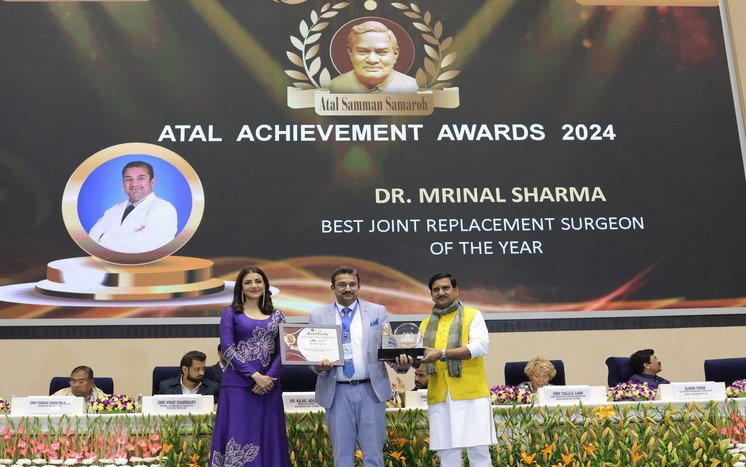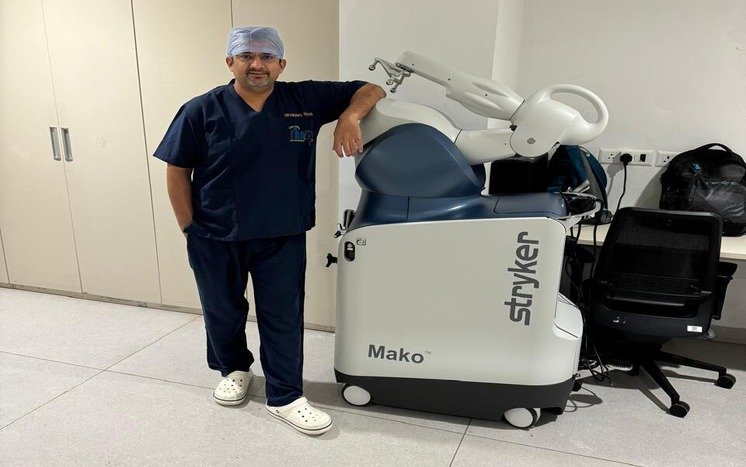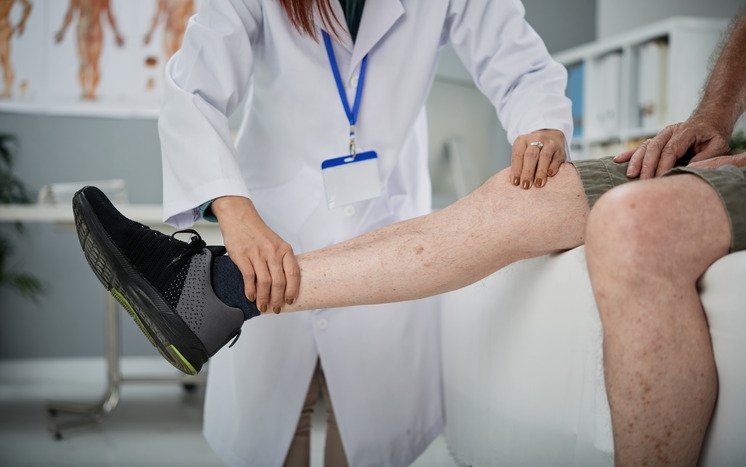
10:00am to 04:00pm (Mon to Sat) - Amrita Hospital, Faridabad
06:00pm to 08:00pm (Mon to Sat) - Arthrocare Clinic, Noida
10:00am to 04:00pm (Mon to Sat) - Amrita Hospital, Faridabad
06:00pm to 08:00pm (Mon to Sat) - Arthrocare Clinic, Noida
 December 27, 2023
December 27, 2023
1. Introduction to Knee Replacement:
Knee replacement surgery is a transformative procedure designed to alleviate pain and restore mobility in individuals with debilitating knee conditions. Commonly performed to address conditions like osteoarthritis or rheumatoid arthritis, knee replacement involves the removal of damaged parts of the knee joint and inserting an artificial joint, typically made of metal and plastic. The goal is to enhance joint function, reduce pain, and improve overall quality of life.
2. Expertise of Knee Replacement Doctors:
Knee replacement doctor, often orthopedic surgeons, possess unique skills and specialized training that make them experts in the field. Their extensive knowledge of the musculoskeletal system, particularly the intricate workings of the knee joint, allows them to understand the complexities of knee conditions comprehensively. This expertise is fundamental in determining the most suitable treatment options for each patient, considering the individual’s unique anatomy and medical history.
3. Patient Evaluation and Diagnosis:
The journey to restored mobility begins with a thorough evaluation conducted by knee replacement doctors. These specialists meticulously assess the severity of knee conditions by combining clinical assessments and advanced imaging techniques. X-rays, MRIs, and other diagnostic tools provide a detailed view of the joint’s structure, enabling doctors to make informed decisions about the most appropriate course of action.
4. Treatment Planning:
Once the evaluation is complete, knee replacement doctor develop personalized treatment plans tailored to each patient’s specific needs. While knee replacement surgery is a common intervention, doctors prioritize conservative treatments whenever possible. This may include lifestyle modifications, physical therapy, pain management strategies, and medication. The goal is to explore non-surgical avenues before considering more invasive interventions, ensuring that the chosen treatment aligns with the patient’s overall health and lifestyle.
The meticulous planning undertaken by knee replacement doctors ensures that each patient receives a customized approach to their care. This not only addresses the immediate concerns but also considers the individual’s long-term well-being. By combining their surgical expertise with a commitment to conservative care, knee replacement doctors play a pivotal role in helping patients regain mobility and enjoy an improved quality of life.
5. Educating Patients:
Knee replacement doctors play a pivotal role in patient education, empowering individuals to make informed decisions about their health. They act as guides, providing comprehensive information about the patient’s knee condition, available treatment options, and potential outcomes. By fostering open communication, knee replacement doctors ensure that patients understand the nature of their condition, the risks and benefits of various interventions, and what to expect throughout the treatment process. Informed decision-making is a cornerstone of successful outcomes, allowing patients to actively participate in shaping their healthcare journey.
6. Surgical Expertise:
The surgical expertise of knee replacement doctors is a cornerstone of the restoration of mobility. During the actual procedure, these specialists demonstrate precision and skill by removing damaged joint components and replacing them with artificial implants. Advancements in surgical techniques, such as minimally invasive approaches, have revolutionized knee replacement surgeries. Minimally invasive procedures result in smaller incisions, reduced trauma to surrounding tissues, and faster recovery times. Knee replacement doctors stay at the forefront of these innovations, integrating them into their practices to enhance patient outcomes.
7. Implant Selection and Customization:
The selection and customization of implants are critical aspects of knee replacement surgery. Knee replacement doctors carefully assess individual patient anatomy and consider lifestyle factors when choosing the most appropriate implants. Advances in implant technology have led to more durable, long-lasting, and anatomically accurate options. The customization ensures that the artificial joint mimics the natural range of motion, optimizing function and reducing the risk of complications. Knee replacement doctors leverage these innovations to provide patients with tailored solutions that align with their unique needs.
8. Postoperative Care and Rehabilitation:
The commitment of knee replacement doctor extends well beyond the operating room. Postoperative care and rehabilitation are integral components of the patient’s journey to restored mobility. Knee replacement doctors collaborate with physical therapists to design personalized rehabilitation plans. These plans typically involve a combination of exercises and therapies to strengthen the muscles surrounding the knee, improve flexibility, and promote overall joint function. This ongoing support is essential for patients navigating recovery, ensuring a smooth transition to an active and mobile lifestyle.
In essence, knee replacement doctors serve as educators, skilled surgeons, and partners in the ongoing well-being of their patients. Through patient education, surgical expertise, implant selection, and postoperative care, these specialists contribute significantly to restoring mobility and enhancing patients’ overall quality of life.
9. Addressing Complications and Challenges:
Knee replacement doctors are not only skilled surgeons but also adept problem solvers. They are crucial in addressing and managing complications that may arise post-surgery. Complications, although rare, can include infection, blood clots, or issues with the implant. Knee replacement doctors leverage their expertise to identify and address these challenges swiftly, ensuring the best possible outcomes for their patients. Their ability to navigate complexities is a testament to their commitment to patient safety and well-being.
10. Monitoring Long-Term Results:
The relationship between knee replacement doctors and their patients extends beyond the immediate postoperative period. Knee replacement doctors institute long-term follow-up and monitoring protocols to ensure sustained mobility improvements. This ongoing commitment involves regular check-ups, imaging assessments, and discussions about patient condition changes. By monitoring long-term results, knee replacement doctors can proactively address any emerging issues, further enhancing the quality of life for their patients.
11. Patient Success Stories:
Real-life patient success stories are powerful testimonials of knee replacement doctors’ positive impact on restoring mobility. Sharing these stories inspires and hope to individuals considering or recovering from knee replacement surgery. Patient testimonials often highlight the physical improvements and the enhanced quality of life, showcasing the transformative effect knee replacement can have on an individual’s overall well-being.
12. Collaborative Approach:
The journey to optimal results in knee replacement involves a collaborative approach between doctors and patients. Knee replacement doctors stress the importance of ongoing communication and follow-up to achieve long-term success. This collaborative relationship ensures that patients actively participate in their care, providing valuable insights into their experiences and helping doctors tailor treatment plans to individual needs. The synergy between medical expertise and patient engagement is key to achieving and maintaining optimal results.
13. Future Directions and Innovations:
Knee replacement doctors are at the forefront of embracing emerging technologies and innovations. As medical science progresses, these specialists remain committed to staying abreast of advancements that may further enhance mobility restoration. From advances in implant materials to innovative surgical techniques, knee replacement doctors strive to incorporate the latest developments into their practices, ensuring patients benefit from the most cutting-edge and effective solutions.
14. Conclusion:
In conclusion, knee replacement doctor play a multifaceted role in restoring mobility. From expert surgical skills to addressing complications, monitoring long-term results, and embracing future innovations, these specialists are dedicated to the well-being of their patients. If you or a loved one is considering knee replacement as a potential solution for mobility challenges, seeking professional guidance from a knee replacement doctor is paramount. Their expertise, commitment, and collaborative approach are integral to the success of the procedure and the transformative impact it can have on the lives of individuals seeking improved mobility and quality of life.





© 2024 Dr. Mrinal Sharma | All rights reserved. Designed and Developed by DigiTrend